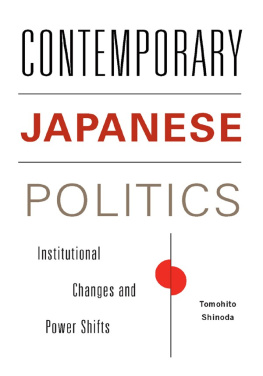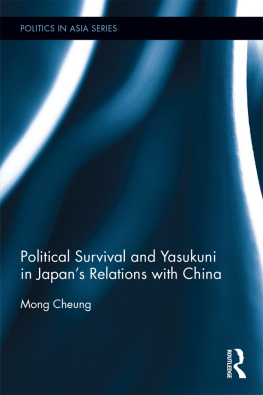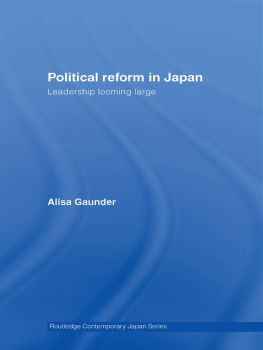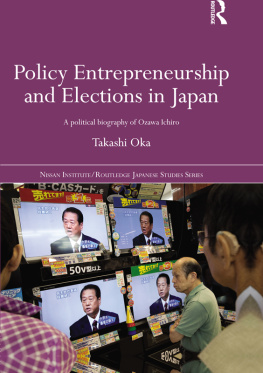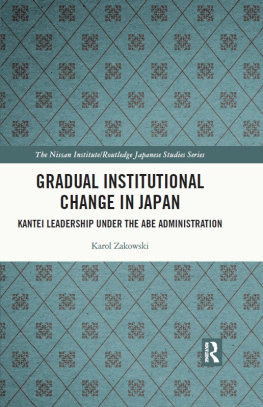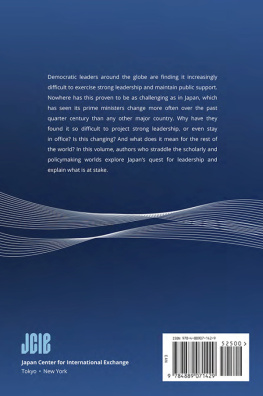CONTEMPORARY JAPANESE POLITICS
Contemporary Asia in the World
Contemporary Asia in the World
David C. Kang and Victor D. Cha, Editors
This series aims to address a gap in the public-policy and scholarly discussion of Asia. It seeks to promote books and studies that are on the cutting edge of their respective disciplines or in the promotion of multidisciplinary or interdisciplinary research but that are also accessible to a wider readership. The editors seek to showcase the best scholarly and public-policy arguments on Asia from any field, including politics, history, economics, and cultural studies.
Beyond the Final Score: The Politics of Sport in Asia, Victor D. Cha, 2008
The Power of the Internet in China : Citizen Activism Online, Guobin Yang, 2009
China and India : Prospects for Peace, Jonathan Holslag, 2010
India, Pakistan, and the Bomb: Debating Nuclear Stability in South Asia, umit Ganguly and S. Paul Kapur, 2010
Living with the Dragon: How the American Public Views the Rise of China, Benjamin I. Page and Tao Xie, 2010
East Asia Before the West: Five Centuries of Trade and Tribute, David C. Kang, 2010
Harmony and War: Confucian Culture and Chinese Power Politics, Yuan-Kang Wang, 2011
Strong Society, Smart State: The Rise of Public Opinion in Chinas Japan Policy, James Reilly, 2012
Asias Space Race: National Motivations, Regional Rivalries, and International Risks, James Clay Moltz, 2012
Never Forget National Humiliation: Historical Memory in Chinese Politics and Foreign Relations, Zheng Wang, 2012
Green Innovation in China: Chinas Wind Power Industry and the Global Transition to a Low-Carbon Economy, Joanna I. Lewis, 2013
The Great Kant Earthquake and the Chimera of National Reconstruction in Japan, J. Charles Schencking, 2013
Security and Profit in Chinas Energy Policy: Hedging Against Risk, ystein Tunsj, 2013
Return of the Dragon: Rising China and Regional Security, Denny Roy, 2013
CONTEMPORARY JAPANESE POLITICS
Institutional Changes and Power Shifts
TOMOHITO SHINODA
COLUMBIA UNIVERSITY PRESS New York
COLUMBIA UNIVERSITY PRESS
Publishers Since 1893
NEW YORK CHICHESTER, WEST SUSSEX
cup.columbia.edu
Copyright 2013 Columbia University Press
All rights reserved
E-ISBN 978-0-231-52806-1
Library of Congress Cataloging-in-Publication Data
Shinoda, Tomohito, 1960
Contemporary Japanese politics : institutional changes and power shifts / Tomohito Shinoda.
pages cm(Contemporary Asia in the world)
Includes bibliographical references and index.
ISBN 978-0-231-15852-7 (cloth : alk. paper)ISBN 978-0-231-15853-4 (pbk. : alk. paper)ISBN 978-0-231-52806-1 (ebook)
1. JapanPolitics and government1989 I. Title.
DS891.S546 2013
320.952dc23
2013012145
A Columbia University Press E-book.
CUP would be pleased to hear about your reading experience with this e-book at .
BOOK DESIGN BY CHANG JAE LEE, COVER DESIGN BY THOMAS STVAN
References to Internet Web sites (URLs) were accurate at the time of writing. Neither the author nor Columbia University Press is responsible for URLs that may have expired or changed since the manuscript was prepared.
To Gretchen and Erika
CONTENTS
A FTER I COMPLETED my doctoral dissertation on the role of the Japanese prime minister in 1994, I focused my research on political institutional changes and their impact on leadership by the national leader. In my first English-language book, Leading Japan, I argued that the prime minister can make a difference by using his formal and informal sources of power. My second English-language book, Koizumi Diplomacy, described how the prime minister took advantage of newly strengthened political institutions to exercise top-down leadership on national security issues. Contemporary Japanese Politics is the most comprehensive book covering institutional changes and analyzing how and when the national leader can be effective.
This book would not have been possible without the support of many individuals. I am particularly indebted to George R. Packard and the late Sohei Nakayama, who both provided me with guidance throughout my academic and professional career. Without them, my academic career would not have even begun.
Over the past years I have had the opportunity to interview many important policy makers. Their comments provided significant insights into how the government functions and how decisions are made. My thanks go to Tatsuo Arima, Keiichir Asao, Kenji Eda, Yasuo Fukuda, Motohisa Furukawa, Teijir Furukawa, Masaharu Gotda, Yoshihiro Handa, Yoshimasa Hayashi, Morihiro Hosokawa, Toshio Kitazawa, Yutaka Kobayashi, Keiichi Konaga, Tar Kno, Michihiko Kunihiro, Yoriko Madoka, Junzo Matoba, Jun Matsumoto, Raisuke Miyawaki, Tomiichi Murayama, Akihisa Nagashima, Mieko Nakabayashi, Yasuhiro Nakasone, Tetsuya Nishikawa, Yasutoshi Nishimura, Motohiro no, Nobumori tani, Hiroshige Sek, Masahiko Shibayama, Kaname Tajima, Takuya Tasso, Noboru Yamaguchi, Tsuyoshi Yamaguchi, and Kyji Yanagisawa. I would also like to thank all the other interviewees in the Japanese government who preferred to remain anonymous. If readers feel that this work is unique and concrete, it is because of their invaluable comments.
In the final six months of my work on this book, I was also involved in a project organized by the Rebuild Japan Initiative Foundation to evaluate the government response to the Fukushima nuclear accident. In this project I heard insightful testimony while participating in a group interview with high governmental officials, including Naoto Kan, Yukio Edano, Banri Kaieda, Tetsur Fukuyama, and Gshi Hosono. I am grateful to Yichi Funabashi for inviting me to participate in the project.
I would like to express my gratitude to many scholars for their valuable input. They include Robert Angel, James Auer, Kent Calder, I. M. Destler, Chihiro Hosoya, Carl Jackson, Glenn Hook, Takashi Inoguchi, Richard Katz, Ellis Krauss, Seigen Miyasato, Henry Nau, Robert Pekkanen, T. J. Pempel, Richard Samuels, James Schoff, Sheila Smith, Michael Smitka, Yoshihide Soeya, Akihiko Tanaka, Nathaniel Thayer, Akio Watanabe, and anonymous readers. I owe special thanks to two anonymous reviewers for the insightful suggestions on revising the introduction.
My sincere gratitude goes to Victor Cha, who recommended me to Columbia University Presss series of Contemporary Asia in the World, and to Anne Routon of the Press for her support of this book project. Research support for this study came principally from JSPS KAKENHI Grant Number 22530168.
Finally, I dedicate this work to the two most important women in my lifemy wife Gretchen and daughter Erika, who brought new meaning to my life and motivation to finish this project.
J APANESE WORDS AND PERSONAL NAMES are romanized according to the modified Hepburn system. Japanese personal names are normally presented in the Western order, with the exception of Japanese scholars whose Japanese-language publications give the authors name in Japanese order. Most monetary figures are given in yen and not translated into U.S. dollars.
| amakudari | institutional practice of placing Japanese senior bureaucrats in high-profile positions in the private and public sectors |

